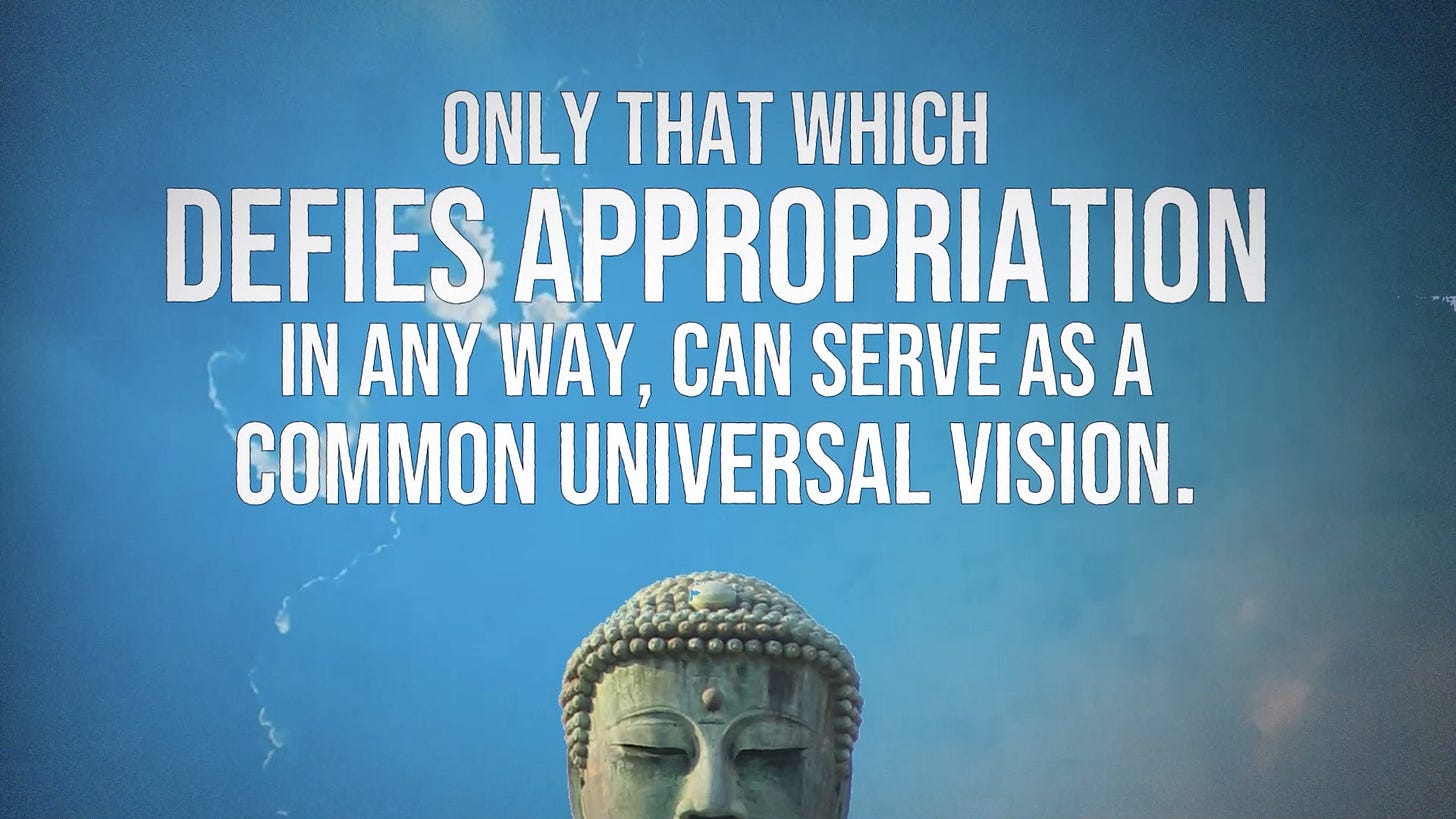What is the Transcendental?
How a Higher Vision Can Unite and Heal Society
The transcendental holds the key to dissolving our problems, it is the ultimate answer we seek. Individually it fulfils our deepest wishes. Collectively, it gives us a vision to unite us and provide societal direction. Without reference to something greater than us, we falter both as individuals and as a community, a situation that I believe reflects the current state of our society.
What is the ‘Transcendental’?
The word transcendental is often used for what the Buddha referred to as ‘Lokattura; that which is beyond the world. Other translations include ‘The Unconditioned’, or ‘Supramundane’.
The word ‘Transcendental’ may sound a bit ‘Woo Woo’ but really what it is pointing to, isn’t too outlandish...
For example- take you, take any of us- we feel like we are a separate person, separate from the world, separate from other people. That’s our everyday experience. We divide our experience into ‘me’ and the ‘world’.
But when we think about it and examine this idea doesn’t really add up- our bodies are made up of the stuff we eat, drink, and breathe in. It enters into us, then passes out- no part of us is fixed and stays the same, there’s no part of us we can point to and say ‘that’s me, that’s my essence’.
The same mentally- we are a collection of thoughts and feelings, memories- if we examine our stream of consciousness, we will not find anything fixed there either- we will find a flow of ever-changing mental states and thoughts.
Some believe that we have an eternal, unchanging soul which goes to up to heaven (or down to hell) when we die. Others believe that it is reincarnated life after life. Buddhism does not hold either of these eternalist views. It maintains that there is no ‘fixed self’ no eternal essence. But it doesn’t go to the other extreme of saying we don’t exist- the nihilist view, but rather it says we exist as a flow- a middle way between externalism and nihilism.
So, Buddhist practice involves aligning our thoughts and emotions with the notion that we do not exist as a fixed self.
This is no easy task, as it means upending our most ingrained assumptions, but if we can manage it, we stop experiencing ourselves as a fixed separate being and now experience ourselves as connected with all beings. We have transcended the illusion of a self and other, and become a Buddha! Having been freed from the prison of ‘fixed self’ we now experience unhindered connection with others- love and kindness flow freely. Up to now we have experienced kindness intermittently and imperfectly, but now there is nothing to check the flow of kindness and compassion.
Kindness as a path to the Transcendental
So the path of Transcendence leads to kindness and selflessness. But we could also put it the other way around. The practice of kindness leads to the transcendental. After all- we all know what kindness is; we been touched by it, all are capable of kindness-, however flawed we are. This is a taste of the transcendent, however faint, a taste of selflessness, of connection with something beyond ourselves.
If we make a conscious effort to turn our mind towards kindness- kindle the flame of it, reflect on it, look for it in ourselves and others, if we train in it, dwell in it, delight in it, we will be on the path to the transcendental, the path to enlightenment.
This is not a sentimental way of looking at things as far as Buddhism is concerned, kindness is inseparable from wisdom; true kindness is the most appropriate response to reality.
Collective Transcendental Vision
It is very hard, if not impossible to tread this path alone- the easiest way is to tread this path with others, to join with others whose goal, who’s orientation is also to transcend themselves; egos coming together to achieve ego-lessness. We need a culture which ultimately points to the transcendental. The trouble is, in this age of secularism, the highest goal is not usually the transcendental. They tend to not be things which lead to our going beyond ourselves, going beyond self. They tend to be things which keep us imprisoned in self, and sometimes reinforce the delusion.
Lets look at how philosophically, religiously and culturally we do not have a strong enough vision of the transcendental.
Refuting Scientism
‘Scientism’ is perhaps the dominant belief system of the age. It is the belief that science and the scientific method, or at least what its adherents consider such, are the best or only way to gain valid knowledge about the world. From a Buddhist perspective, true understanding encompasses not only empirical evidence but also the direct, experiential knowledge of the mind and consciousness; but scientism tries to remove the part played by the observer completely. Strangely, scientism is not actually scientific – it tends to be narrow and dogmatic, rejecting evidence which doesn’t fit with its existing paradigm. The dominance of ‘scientism’ in society, narrows our horizons-it disregards the insights gained through introspection, meditation, and spiritual practice, and the means through which the transcendental can be known.
God
The concept of God presents something beyond the world something bigger than ourselves, and to some extent represents transcendence. But the influence of God in society has severely reduced over the past 100 years; and anyway, the concept of god falls short of what Buddhism considers the transcendental. The problem of god is that he is usually conceived of as a literal, existing supreme being, and as such doesn’t allow us to transcend self and other, subject and object According to Buddhist metaphysics- if there is something in the universe conceived of as existing independently and objectively, then there is still subject and object, still self and other and therefore still greed hatred and delusion. By contrast, although Buddhas and Bodhisattvas are worshipped and visualized by Buddhists- they are not considered independently existing entities- rather they are the transcendental as perceived by human consciousness.
The lack of a true transcendental goal in a religion, also leads to problems of literalism. If words are not used to ultimately point beyond words, then meanings become literalised, which leads to belief systems becoming ossified, and unable to move with the times.
The Vacuum
Despite the problems with god being unable to provide a true transcendental ideal, he has left a big hole in society. In addition to that the preponderance of scientism in society has left us with a meaning crisis. People need their lives to be about something, and they need a group to feel a part of. Into the vacuum traditionally filled by religion, have swept many different group identities, ideologies and causes.
Many of these are important and serve a purpose- but without reference to the trancendental- without reference to something which goes beyond individualism- they can become toxic:
Group identities mean we end up demonising other groups. With no higher moral values to check them, ideologies lead to moral relativism where the end justifies the mean. Just causes become means to assert oneself and seek power.
The Only Common Denominator
No ideology or group identity can include everyone. Ideologies cannot do it- because there is always someone who takes another view and disagrees. Group identities cannot do it- because by definition they exclude people who do not have the characteristics to belong to that group.
To have a truly unified community- it needs to be something that transcends self and other, transcends subject and object, transcends concepts. Only that which defies being appropriated in any way, can provide a universal vision.
Now it is highly unlikely that all of society will convert to Buddhism. But I hope the transcendental principal in Buddhism can influence these ideologies, religions and group identities.
We desperately need an underlying philosophy that appreciates the benefits of science and objective enquiry without dismissing subjective experience, and stifling the imagination.
God needs to be reimagined as a metaphor for the transcendental, rather than being viewed strictly as an objective entity or supreme being, thereby bringing out the best of theistic traditions.
All the causes and ideologies people identify with, must subordinate themselves to the transcendental, so that their influence in society can be based on compassion and not power.
Ultimately, as we examine our society's philosophical foundations, we can remember that kindness is universally desired and agreed upon, making it a practical path to individual and collective transcendence.







